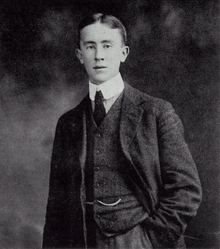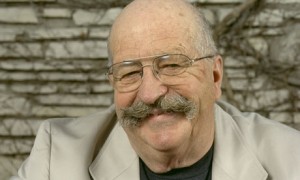 One fascinating aspect of J. R. R. Tolkien’s story is how much his books were despised simply for being heroic sagas. Perhaps that is not quite right. There were pulp swords and sorcery stories that the intelligentsia simply ignored rather than despised. Who cares about “low” literature, right? Tolkien’s offense was that he was an Oxford don who refused to despise such stories and wrote a serious one because he thought they were important.
One fascinating aspect of J. R. R. Tolkien’s story is how much his books were despised simply for being heroic sagas. Perhaps that is not quite right. There were pulp swords and sorcery stories that the intelligentsia simply ignored rather than despised. Who cares about “low” literature, right? Tolkien’s offense was that he was an Oxford don who refused to despise such stories and wrote a serious one because he thought they were important.
Why was this so terrible? I’ve read the reasons and try to relate them briefly in my biography. But it would have been helpful if I had re-read Aldous Huxley’s Brave New World, especially 2003 edition which has Christopher Hitchens’ introduction and includes Revisiting Brave New World.
Here is the quotation that reminded me quite strongly of the opposition to Tolkien’s Lord of the Rings:
civilization has absolutely no need of nobility or heroism
(via Brave New World – Wikiquote)

This is the voice of the new “modern” world.
When you read Brave New World you are entering a civilization that is based on compliance and consumption as the only path to prosperity. Other than a minimal workday nothing is demanded and everything is offered. No one must wait for sexual gratification nor associate with any exclusive relationship. There are no exclusive relationships (“Everyone belongs to everybody else” as all are conditioned to recite). There is no one to fight for. No one to protect. No one to care for. There are only virtual reality porn experiences and drugs. There is even a kind of religious ecstasy event in which sex and drugs are made into a ritual. Games are forbidden unless they involve expensive equipment to boost spending.
But the direct opposition between Tolkien and Huxley is missed because Brave New World is posed as a kind of dystopian warning, along the lines of 1984 by George Orwell.
This is disinformation. Huxley was not warning against dystopia. He was spelling out his utopia and telling the reader, to borrow from later science fiction, that “resistance is futile; you will be assimilated.” Or else you can go commit suicide.
That is precisely the structure of the narrative of Brave New World. We are presented with a world in which there are a couple of discontents. These are entirely explained by problems with either the biological manufacturing or the fact that society still has a few, very few, needs that allow for the possibility of unhappiness among the “alphas.”
If you have been living in a literary hole: In Brave New World, no one is born and the word “mother” is the most disgusting term imaginable. Babies are mass produced and only Alphas and Betas are allowed to develop normally. Gammas, Deltas, and Epsilons are all deliberately brain damaged in their artificial wombs to do menial work.
[I consider it a Freudian slip that there is only one female alpha portrayed in the novel, and she is considered unattractive. But the alpha males (literally!) seem to have a lot of fun with Beta females. It even reaches the point where the “arch-songster” (later explicitly compared to an Arch-Bishop) basically orders a Beta female to service him against her interest. She seems not to notice, but requires the help of the drug soma in order to “happily” participate. So without seeming to notice it, Huxley gives us an allegedly egalitarian society (in some ways, aside from the social caste) which actually is ruled by men for their own immediate needs.]
Eventually a real discontent is introduced–a “savage” from a native American reservation. He ends up so repulsed by “civilization” that he starts a riot trying to offer “freedom.” No one wants it. The riot police take the Savage and his two now contaminated friends to the office of the chief Alpha over that region of the global government. They talk. He is perfectly friendly. He is also pretty much free much of the conditioning that has kept down others. In fact, due to his love of “truth” (i.e. science) he was almost exiled to an island. But instead he took the offered alternative–world power over the civilization and the freedom in his own office to learn real history, read books from his safe, and in general be the intellectual that Aldous Huxley pretended to be. He tells the three that civilization is better off without personal autonomy and that he is a martyr for willingly dealing with his own unhappiness as a frustrated truth-seeking scientist in order to lovingly engineer the society. The two discontents must therefore be exiled and the savage must continue to live elsewhere (the actual decision didn’t make much sense to me).
The Savage runs away to live by himself, but he is eventually hounded by the news media and crowds show up. He is driven to eventually commit suicide out of shame for his sins.
Thus fall all who oppose Huxley’s new world order.
Consider this:
In many ways, Huxley was the last of the great Victorian novelists. He was born in 1894, a grandson of the biologist T H Huxley, “Darwin’s bulldog”. Matthew Arnold was his great-uncle, and his aunt was the novelist Mrs Humphry Ward. Secure in this intellectual aristocracy, he might have rebelled and become a great mid-century English eccentric, a liberally minded chairman of the board of film censors, or the first openly agnostic Archbishop of Canterbury.
However, at the age of 16, while an Eton schoolboy, he caught a serious eye infection that left him blind for a year and may have forced him into a more interior vision of himself. With his one good eye, he read English at Oxford, perhaps the best perspective to take on this dubious subject. He was immensely tall, six feet four-and-a-half inches. Christopher Isherwood said that he was “too tall. I felt an enormous zoological separation from him.” Huxley, curiously, disliked male homosexuality but had many homosexual friends, Isherwood among them.
The young Huxley must have had immense charm. He soon found himself at Garsington Manor, near Oxford, the legendary home of the literary hostess, Lady Ottoline Morrell, where he met Virginia Woolf, Lytton Strachey, Clive Bell and D H Lawrence. Years later, in the south of France, Lawrence died in the arms of Huxley’s wife. In the final minutes before his death, Lawrence suddenly panicked and cried out to Maria Huxley, begging her to keep him alive. She embraced him, and he died peacefully as her husband watched.
Maria was a wartime Belgian refugee whom Huxley met at Garsington and married in 1919. Murray describes their marriage as intensely close and happy, although Maria was an active bisexual. Huxley seems to have taken quickly to their special version of open marriage. They pursued the same lovers together, like a pair of sexual confidence tricksters: Maria encouraging Aldous, introducing him to the beautiful women he admired, preparing the amatory ground and saving him the fatigue of prolonged courtship. Jealousy and possessiveness, which so handicap the rest of us, seemed never to have touched Huxley, an emotional deficit that some readers have noticed in his novels. In the late 1930s, when they moved to Los Angeles, Maria became a member of the “sewing circle”, a club of prominent Hollywood lesbians reputed to include Marlene Dietrich and Greta Garbo.
Lets ignore the light whitewash and point out what is evident. Huxley had absolutely no sexual morality. Nothing going on in Brave New World bothered him. In fact, he portrays the life of a nuclear family as an inherently dangerous and neurotic affair. In his world, Ford and Freud are remembered as the same person and treated with great seriousness. In fact, if you don’t believe in Freud (with a dose of Pavlov) you would never imagine the kind of need for the non-family biological reproduction that monopolizes “Civilization.” Just as, if you didn’t believe in Keynsianism, you would recognize that a “civilization” that deliberately caused unnecessary spending would inevitably fall rather than be the most stable in history. And, of course, Keynes was well placed in Huxley’s intellectual social circle.
Huxley’s portrayal of religion is unrecognizable to most Evangelical Christians. It consists of a mixture of paganism and monkish medievalism. All religious believers practice self-torment and vision quests, self-flegellations and induced vomitings. This is the only form of religion that Huxley can recognize because it keeps at bay the truth. His novel is a lie in every way, unless you read it as an accurate guide to his personal utopia (where he rules the world as a free intellectual among the slaves) and an act of psychological warfare against everyone else.
His book, Brave New World Revisited continues to hide in plain sight. We must avoid the future portrayed in Brave New World! How? Well, mostly by imposing radical population control. Like war leaders claiming that the terrorists “hate us for our freedoms” and then demand we give them all up to fight the terrorists, Huxley wants to save us from Brave New World by implementing its agenda. If we do so, we are to believe that it won’t be quite as “bad” as BNW but will end in a compromise. Huxley claims that in 1932, when he wrote it,
Ours was a nightmare of too little order; theirs.. of too much. In the passing from one extreme to the other, there would be a long interval, so I imagined, during which the more fortunate third of the human race would make the best of both worlds–the disorderly world of liberalism and the much too orderly Brave New World where perfect efficiency left no room for freedom or personal initiative.
Yet, that “world of liberalism” is not dying soon enough, decided Huxley in 1958. There are now “impersonal forces” that are “making the world extremely unsafe for democracy” and “so very inhospitable to individual freedoms.” What are these dire armies of Hell, you ask?
Mainly, browner people having babies.
Here are the causes of our curse:
Penicillin, DDT [! – MH], and clean water are cheap commodities whose effect on public health are out of all proportion to their cost. Even the poorest government is rich enough to provide its subjects with a substantial measure of death control. Birth control is a very different matter…
Huxley goes on cursing the lowering of death rates for pages. It is almost poetic. Jumping in again:
…This is especially true of those underdeveloped regions where a sudden lowering of the death rate by means of DDT [again! –MH], penicillin and clean water has not been accompanied by a corresponding fall in the birth rate. In parts of Asian and in most of Central and South America populations are increasing so fast that they will double themselves in little more than twenty years…. the population of some of these underdeveloped countries is increasing at the rate of 3 per cent per annum.
All of this is accompanied by a great deal of Malthusian nonsense that these countries will never support themselves. This was all wrong in the 1930s as it was in the 1950s and then in the 1970s during the “population bomb” propaganda. It is still false today. Everyone’s living standards have risen with the population–the local exceptions are due to political problems, usually the attempt to impose order.
I could spend all day typing this in, but lets cut to the chase. As he discusses the alleged impossibility of supporting the populations we liberate from death (again, “with the aid of DDT”!), he writes against the problem that we might actually save lives:
And what about the congenitally insufficient organisms, whom our medicine and our social services now preserve so that they may propagate their kind? To help the unfortunate is obviously good. But the wholesale transmission to our descendants of the results of unfavorable mutations, and the progressive contamination of the genetic pool from which the members of our species will have to draw, are no less obviously bad. We are on the horns of an ethical dilemma, and to find the middle way will require all our intelligence and all our good will.
Yeah, keep your “good will” to yourself you Nazi pervert!
Darwin’s bulldog is still on the attack against all the insufficients saved from malaria by “our” DDT (which, we conveniently took away, didn’t we?). Why is this piece of human trash (not genetically, but his own ethical character) given so much glory in our day? How could he get away with writing such eugenicist propaganda as late as 1958? And yet he is still upheld as the great friend of freedom against totalitarianism. This has got to be one of the most amazing bait and switches in the history of propaganda.
And this, I propose, is the intellectual milieu (and there is plenty more evidence elsewhere) in which Tolkien threw his literary hand grenade. Or rather, shot his sharp arrow. He portrayed a world of honor and courage. People like Aldous Huxley wanted such a world to commit suicide to make room for their own–a civilization (so called) that had no need for nobility or heroism.
Postscript: related






 One fascinating aspect of J. R. R. Tolkien’s story is how much his books were despised simply for being heroic sagas. Perhaps that is not quite right. There were pulp swords and sorcery stories that the intelligentsia simply ignored rather than despised. Who cares about “low” literature, right? Tolkien’s offense was that he was an Oxford don who refused to despise such stories and wrote a serious one because he thought they were important.
One fascinating aspect of J. R. R. Tolkien’s story is how much his books were despised simply for being heroic sagas. Perhaps that is not quite right. There were pulp swords and sorcery stories that the intelligentsia simply ignored rather than despised. Who cares about “low” literature, right? Tolkien’s offense was that he was an Oxford don who refused to despise such stories and wrote a serious one because he thought they were important.